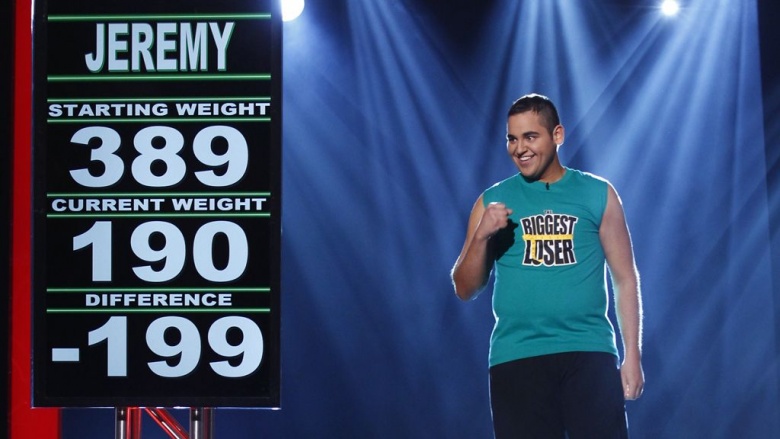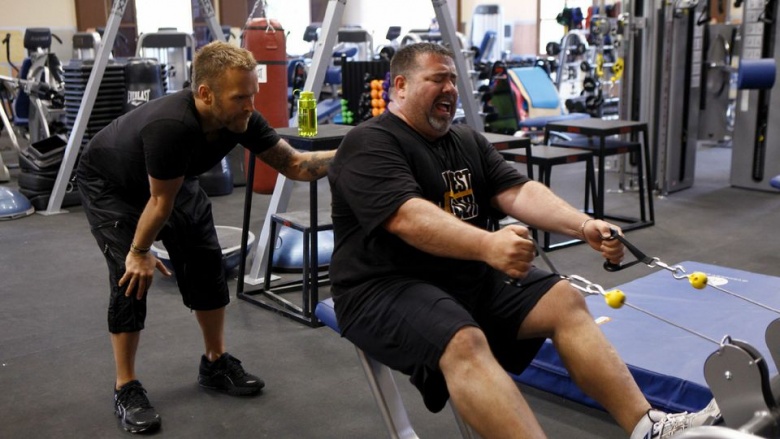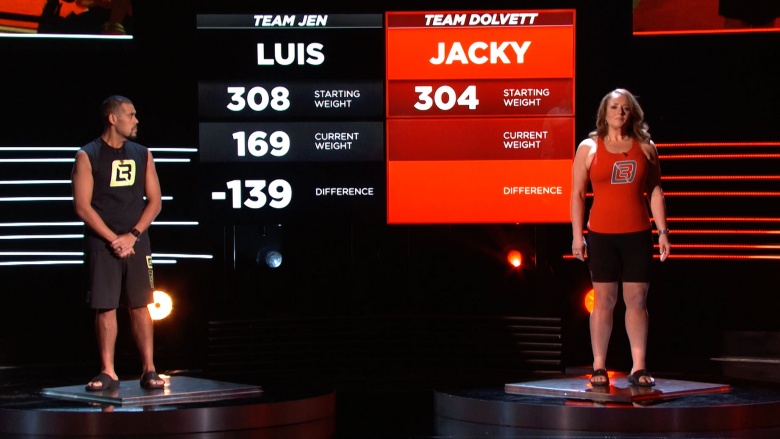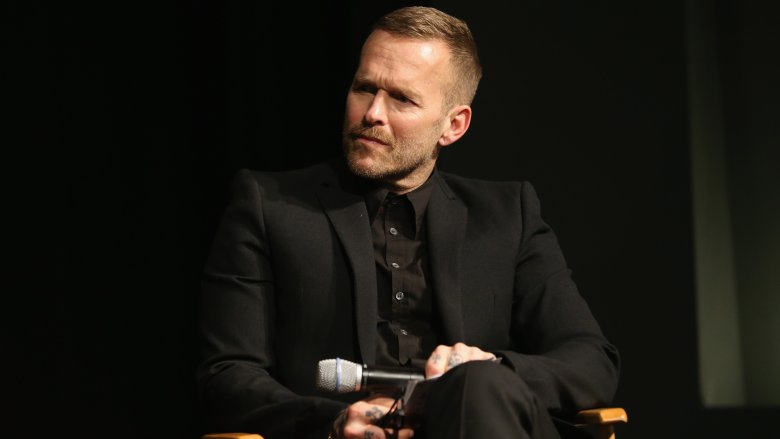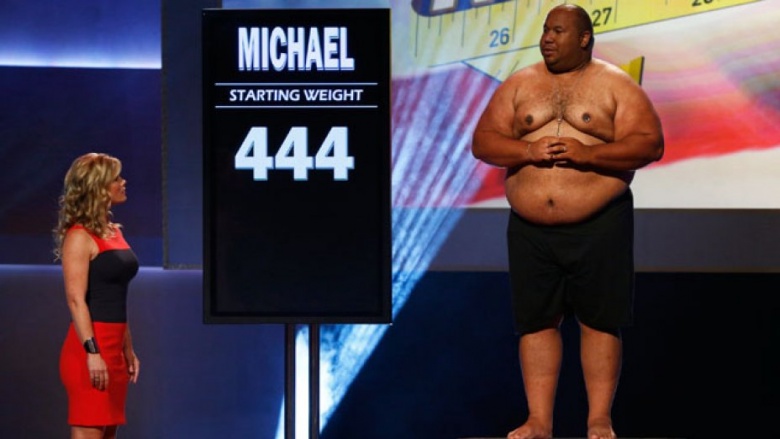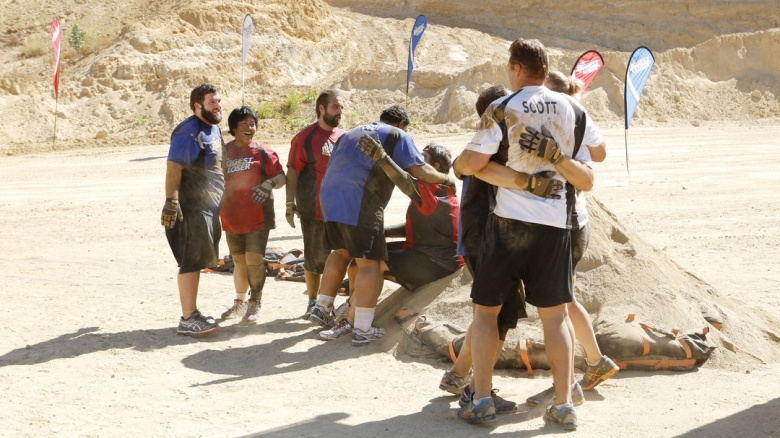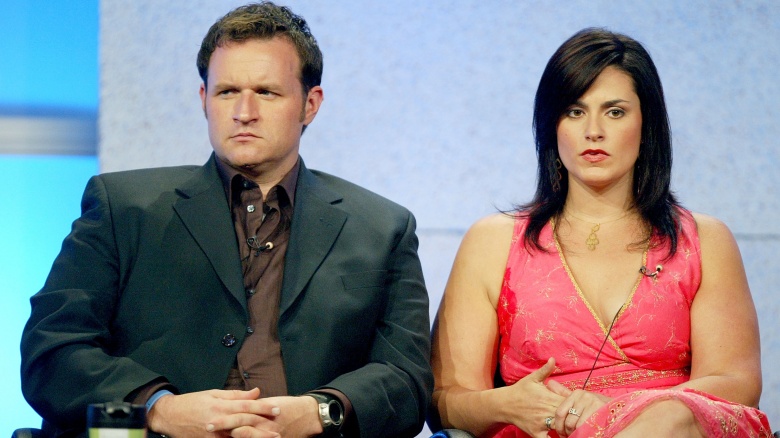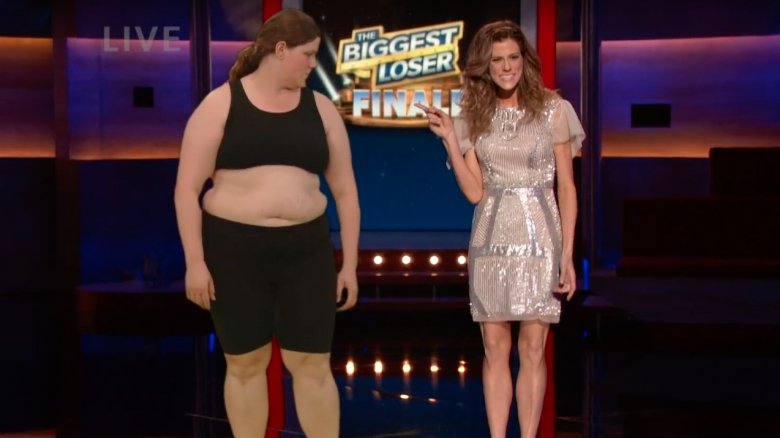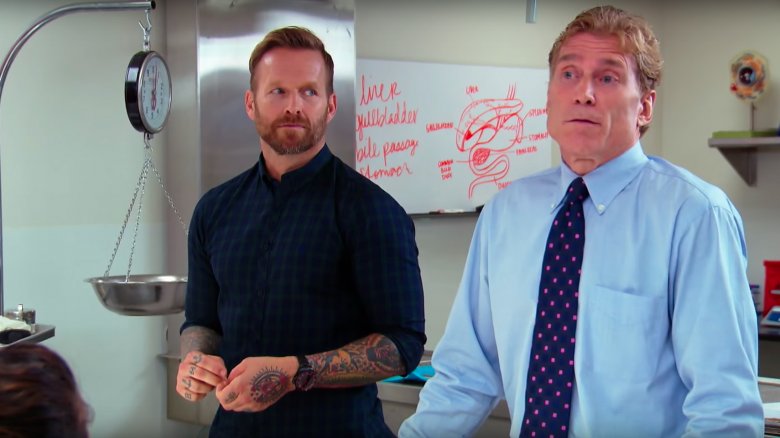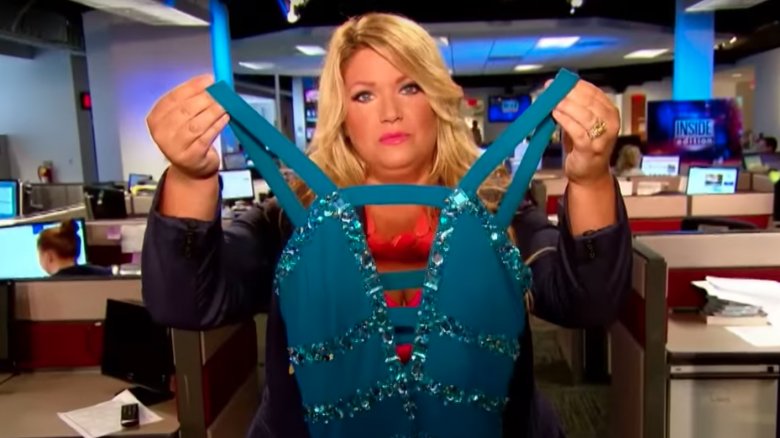Reasons Why The Biggest Loser Is Totally Fake
The Biggest Loser was the subject of constant controversy throughout its 17 seasons on NBC. While the contestants' weight loss was undeniably real, for many of them it didn't last. And, of course, the real question has always been: Was any of this ever a healthy or appropriate way to shed pounds? Aside from that general conundrum posed by the once-popular show, there were many, many other alleged issues as well.
Facing accusations of everything from fat-shaming its contestants, to faking weigh-ins, to promoting unhealthy methods of losing weight, to even causing lifelong problems with maintaining a healthy weight once the contestants return to their regularly scheduled lives, The Biggest Loser ran the gamut of reality TV scandals. At the time of this writing, the show remains in limbo over whether there will ever be a Season 18, possibly due to increased calls from contestants and health professionals to cancel what they call a dangerous show.
So, just how much did this glorified fat camp fudge its results? We're weighing in on all the reasons why The Biggest Loser is totally fake.
They had a funny way of measuring 'one week'
While contestants appeared to be weighed once a week, that period actually changed based on filming schedules, according to Season 3 runner-up Kai Hibbard, who has frequently spoken out about her negative experience on the show, despite the supposed threat of legal action from producers. Hibbard told Cracked the weigh-ins ranged from three weeks to only five days apart, yet the show always portrayed it as one week, meaning audiences at home witnessed large fluctuations in how much weight the contestants appear to lose from week to week. Andrew "Cosi" Costello of the Australian version of the show confirmed this, saying the shortest period between weigh-ins on his season was 16 days.
"In my series a weekly weigh-in was never filmed after just one week of working out," Costello told news.com.au. "The thing is, overweight people get inspired by watching The Biggest Loser. They get off the couch and they hit the gym. But after a week in the real world, some people might only lose 1kg so they feel like they've failed and they give up."
Contestants are made to appear lazy when they're not
According to Hibbard's Cracked interview, a fellow contestant on her season refused to run because she had injured her leg, but the show made it appear as though she refused to run because she was too lazy. That contestant reportedly received so many death threats from viewers online that NBC had to disable the messaging function on its site.
"Five years after the season ended, she even donated a kidney to save a complete stranger's life," Hibbard said, calling the misrepresented woman "one of the kindest individuals I have ever met in my life."
Does the staff play dirty to maximize drama?
Season 2 contestant Suzanne Mendonca told the New York Post that a show doctor advised her and other contestants to eat baking soda to fight dehydration, but she alleges that recommendation was designed to covertly make them retain water and thus weigh more and be eliminated so that more dramatic contestants could stick around. "They definitely tried to manipulate the game for ratings, and if they could do it with contestants' weight, they'd do it," she said.
But the shady tactics didn't stop there. Mendonca also told Entertainment Tonight that she regained 130 pounds after leaving the show, adding that there were "so many unhealthy things they do on the show that are not sustainable in real life." She also told the GLOBE (via CelebDirtyLaundry.com), "I was eating baby food. I'd wrap myself in garbage bags to sweat. We would use the sauna for six hours a day. People were passing out in the doctor's office."
However, baking soda, garbage bags and baby food supposedly weren't the worst things that contestants say doctors and trainers on the show encouraged them to use...
The show has been investigated for illegal drugs
Other contestants went even further with their allegations against the show, claiming staff encouraged them to take illegal drugs, including Adderall and the FDA-banned weight loss substance ephedra. "Bob Harper was my trainer," 2008 contestant Joelle Gwynn told the New York Post. "He goes away and his assistant comes in. He's got this brown paper bag that's bundled up. He says, 'Take this drug, it'll really help you.' It was yellow and black. I was like, 'What the f**k is this?'"
"I felt jittery and hyper," Gwynn recalled, having taken the pill once. "I went and told the sports medicine guy. The next day, Dr. [Robert Huizenga] gave us some lame explanation of why they got added to our regimen and that it was up to us to take them ... People chastise Bill Cosby for allegedly offering meds to women, but it's acceptable to do to fat people to make them lose weight. I feel like we got raped, too."
Authorities launched an inquiry into the show in May 2016. The program has denied the accusations. "The safety and well-being of our contestants is, and always has been, paramount," the producers said in a statement (via the New York Post). "We prohibit the use of any illegal substances, in addition to the many other rules and procedures of the show that are designed to ensure safety."
The famous scale is fake
Contestants revealed the televised weigh-in scale isn't actually real. "It is a fake scale that you weigh-in on," Mendonca told Entertainment Tonight. "They have the scale on TV. When the contestants step on the scale they don't even know their real weight and how much they dropped. You're weighed two days prior to a real weigh-in that's taped on TV."
Hibbard confirmed this, telling Cracked, "Even the giant scale they had us all weigh in on was fake." Costello also said the flashy scales from the Australian version of the show are not real. Executive producer Dave Broome eventually set rumors about the scale to rest, telling the Today show that contestants are, indeed, weighed beforehand and the weigh-in on the big, snazzy scale is just a prop used for television.
You probably can't and shouldn't try this at home
While the show made it clear that contestants were exercising constantly, it didn't show just how much. According to The Guardian, competitors were actually grinding out six to eight hours worth of exercise a day. Not only is this incredibly unhealthy and far more workout time than is recommended by doctors, it's also much more than a regular person could reasonably commit to. Though the series claimed its workout plans were doable for you, the viewer watching from home, you probably can't and shouldn't replicate that degree of intensity.
And wasn't just the workouts. A National Institute of Health study confirmed several contestants' claims that the show wreaked havoc on their metabolisms and left them prone to quickly gain back the weight they lost, and more, after returning to regular life. The show has denied the allegations. "We put together an incredible medical team of doctors, nutritionists and therapists," executive producer Dave Broome told People. "You name it we've had it and continue to evolve [our supervised care]. [There are] millions of people around the world whose lives have been changed."
Contestants go to extreme measures before weigh-ins
Contestants desperate to stay on the show sometimes resorted to extreme and dangerous measures to lose a few last-minute pounds. Former contestants have said the cast would often refuse to drink water or eat any solid food the day before weigh-ins to make it seem like they had lost more weight.
Season 1 winner Ryan Benson (above left) wrote on his blog (via Breaking Muscle) that he was so desperate to win that he abstained from eating solid food for the last ten days before the final weigh-in, consuming only a "Master Cleanse" diet of water, lemon juice, maple syrup, and cayenne pepper. Then for an entire day ahead of the final weigh-in, Benson claims he consumed absolutely nothing, even water. "I started using some old high school wrestling tricks," Benson wrote, adding, "I wore a rubber suit while jogging on the treadmill, and then spent a lot of time in the steam room. In the final 24 hours I probably dropped 10-13 lbs. in just pure water weight. By the time of the final weigh-in I was peeing blood."
Benson went on to write that he "gained about 32lbs" in just "the five days after the show was over," which he attributed "mostly [to] re-hydrating [himself]." Trainer Jillian Michaels later told The New York Times that Benson's story illustrates the "dark side" of the show, but is not representative of what every contestant goes through.
Numerous trainers have turned their backs on the show
The Biggest Loser's weight loss methods are controversial among viewers and medical health professionals and have even prompted some trainers to turn down lucrative opportunities to work with the show. Harley Pasternak, a personal trainer and bestselling author, told The Guardian he was hired as a trainer for the show in 2004 but backed out when he realized the program was going to employ dramatic methods, such as screaming at contestants. "Those entertaining scenarios make for great television," he said. "But it's not for someone who is concerned with making people healthy."
Fitness trainer Nia Shanks penned a blog titled "Why The Biggest Loser Sucks," in which she criticized one of trainer Jillian Michaels exercise moves as "worthless and you shouldn't do it," deeming the justification that "it works your core" as "crap." Well, then.
Michaels, one of the show's most famous trainers, has even been accused by some of being unqualified for her position. Pasternak, who reportedly dropped out after Michaels was cast, told The Guardian, "The last straw was when they cast an actress opposite me. I was going up against a TV trainer, not a real one." Zing!
Producers allegedly fat shame contestants to create drama
Producers allegedly employ fat-shaming techniques to get camera-worthy reactions from contestants. "There were blown-up photos of our arms and stomachs and thighs decorating our house to show how 'gross' we were," Hibbard told The Guardian. At the end of her season, she claimed producers placed her next to a cardboard cutout of herself from day one and got angry with her when she did not cry.
Losing so much so fast is bad for your health
Losing that much weight that quickly can be very unhealthy and create long-term negative effects on contestants' health and well-being. Countless medical professionals will tell you that losing weight as quickly as contestants do on The Biggest Loser is very bad for your body, and the incredibly intense workouts and very restrictive diets that contestants endure on the show make keeping the weight off after filming nearly impossible.
Kai Hibbard told Cracked that, after the show, her hair fell out due to her immune system shutting down from the extreme weight loss. She also said that participating in the show's intense exercise program caused lasting damage to her knees. "Doctors told me that everything I did to my body on the show was a physician's nightmare," she said.
Perhaps the most jarring example of the extremes contestants went through for the show was when Season 15 winner Rachel Frederickson (above) appeared at the finale, having shed a shocking 155 pounds of her initial 260 pound weight. As a result, questions were raised about her having developed a possible eating disorder, and even trainer Dolvett Quince told People,"The first thing that went through my mind was, 'That's just too much.'"
Was it all bull from the beginning?
In July 2018, The Hollywood Reporter revealed that The Biggest Loser had been fighting behind-the-scenes legal battles regarding alleged inappropriate drug use since long before the explosive claims made by former contestants Joelle Gwynn and Suzanne Mendonca. According to THR's report, there were emails "providing legal advice regarding investigation of allegations of the provision and/or use of Drugs on The Biggest Loser and actions considered in response to such allegations" that "date back to 2008, eight years before allegations surfaced in the press."
The doctor featured most prominently on the show, Dr. Robert Huizenga (above right), sued both Gwynn and The New York Post, who published her allegations, for defamation, claiming he "lost business relationships" with NBC and a slew of other networks as a result of the story. As of this writing, that lawsuit is still ongoing, but with the revelation of the emails dating back to just four years after the premiere of the one-time hit series, the question remains: Was it all a scam from the very beginning?
Nobody told them eating healthy ain't cheap
Obviously, the workouts were the centerpiece of The Biggest Loser. After all, is there a better reality television experience than watching a 400-lb person sweating buckets on a treadmill while you sit on the couch with a pint of Ben & Jerry's? But the show also attempted to teach contestants how to change their eating habits by showing them how to choose and prepare healthier choices for themselves, which they did both on and off camera, according to former contestant Nicole Michalik. Unfortunately, they weren't given all of the details regarding healthy eating.
Speaking with The A.V. Club, Michalik said, "We would give them a list of groceries and they would just buy whatever we wanted. ... I didn't really eat healthy stuff before the show, so I never knew what kind of fish I liked. Doing the show, I found out I really liked Chilean sea bass. After I got voted off, I came home and went to the grocery store and I'm like, 'I'll have eight pieces of Chilean sea bass.' And the guy was like, 'Are you sure?' It was $84. I had no concept of how expensive the food was." Whoops! Maybe that's part of the reason why so many contestants gained back all of the weight that they lost on the show?
The medical staff may not have been legit
As if it wasn't bad enough that the medical staff on the show allegedly supplied contestants with "illicit drugs" in order to speed up their weight loss, The New York Times discovered that said medical staff may not have even been appropriately trained. At least, that's one way to interpret this clause from a release form given to the paper by a former contestant: "No warranty, representation or guarantee has been made as to the qualifications or credentials of the medical professionals who examine me or perform any procedures on me in connection with my participation in the series, or their ability to diagnose medical conditions that may affect my fitness to participate in the series."
Of course, that could be a standard indemnity clause from any TV production that shows people receiving real medical treatment. But it also sounds a whole lot like the show shielding itself from its potential use of supposed medical experts exposing contestants to quack practices, which is exactly what former contestant Suzanne Mendonca (above) claimed happened, according to The Hollywood Reporter. Citing the aforementioned National Institute of Health study, Mendonca said, "There's a research that just came out that it just disturbed and ruined our metabolic rate. They ruined us."
So, not only did Mendonca claim that her weight loss during the show was an illegitimate ruse, but it also may have biologically hampered her from being able to keep the pounds off in the future.


